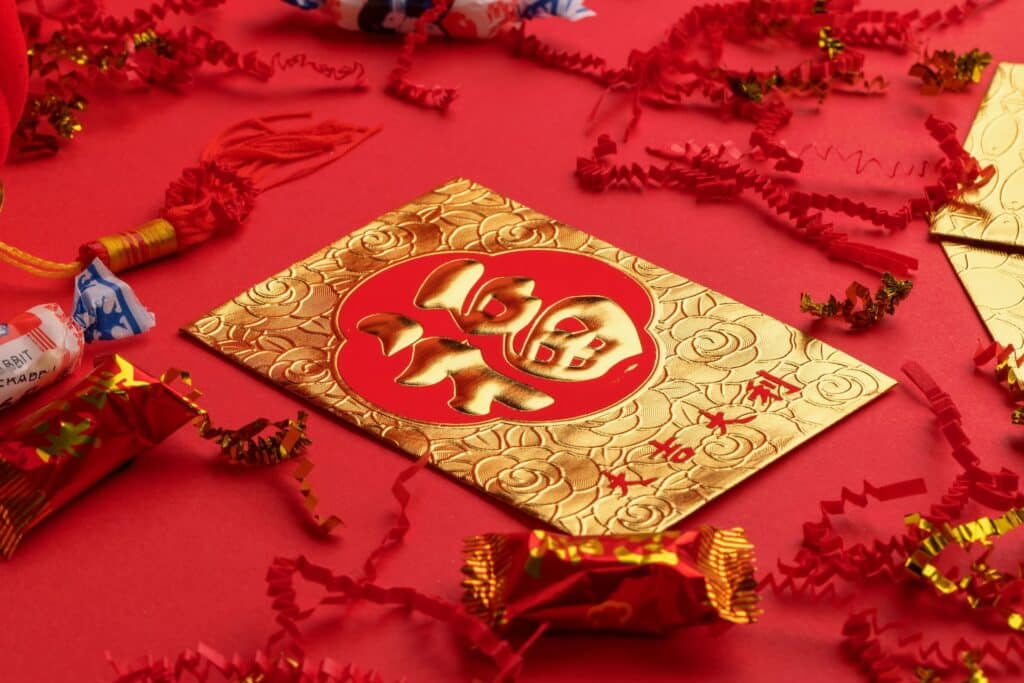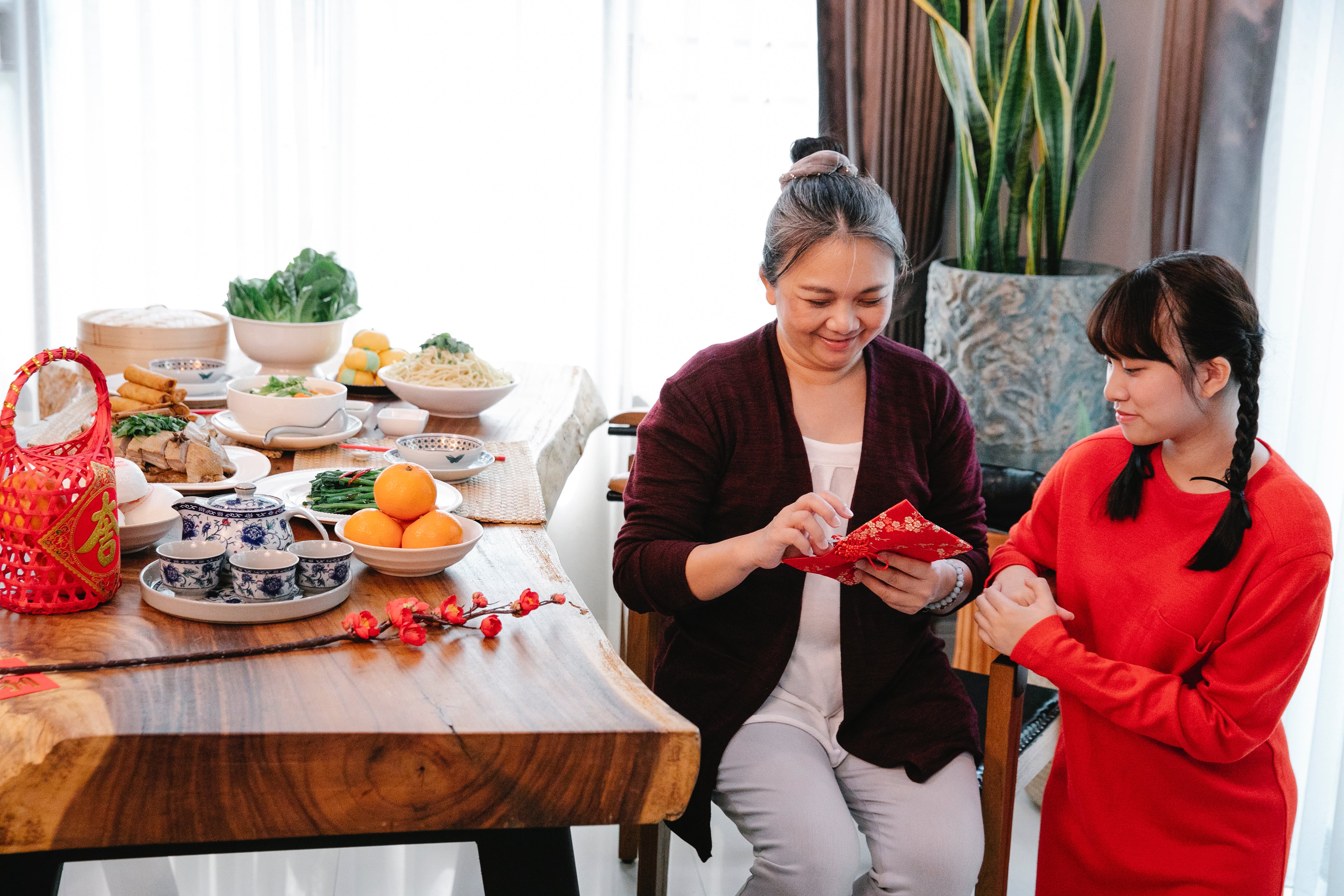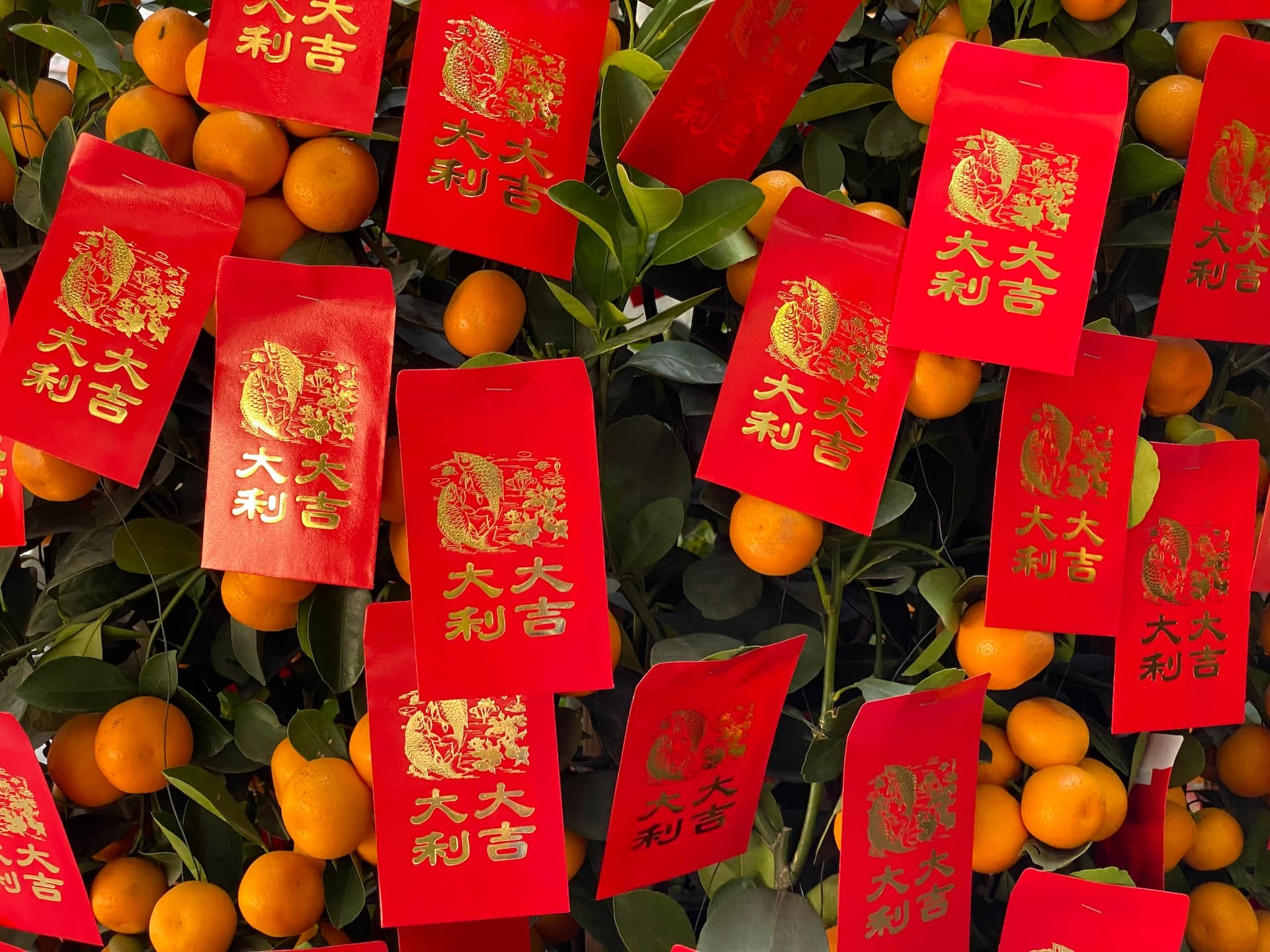
30 Essential Chinese New Year Greetings and Traditions for the Year of the Dragon [2024]
Whether you have Chinese friends or your trip to China falls in the wintertime, Chinese New Year greetings are something you’ll want to know.
Not only will you be able to understand the seasonal vocabulary in the air, but you’ll also deepen your understanding of Chinese culture, considering it’s the biggest holiday of the year.
In 2024, Chinese New Year falls on February 10, though celebrations will last for weeks. And this year, we’re celebrating the Year of the Wood Dragon!
In this post, you’ll learn the must-know Chinese New Year wishes in Mandarin, how to use them correctly and the cultural traditions associated with the holiday.
Contents
- Common Chinese New Year Greetings
- Chinese New Year Wishes for Wealth and Prosperity
-
- 6. 恭喜发财 — Wish you wealth and prosperity
- 7. 财源广进 — May wealth flow in
- 8. 和气生财 — May harmony bring wealth
- 9. 金玉满堂 —May your gold and jade fill the halls
- 10. 一本万利 — Hope you put in a small investment and reap a huge profit
- 11. 招财进宝 — May you find wealth and treasures
- 12. 财源滚滚 — May wealth come pouring in
- 13. 大吉大利 — May you have great luck and great profit
- 14. 年年有余 — May you have abundance every year
- Chinese New Year Wishes for Success in Business
- Chinese New Year Wishes for Happiness, Health and Peace
-
- 21. 心想事成 — May all your wishes come true
- 22. 万事如意 — May everything go well with you
- 23. 笑口常开 — May you smile often
- 24. 五福临門 — May the five blessings come to you
- 25. 身体健康 — Wish you good health
- 26. 竹报平安 — May you hear tidings of peace
- 27. 福寿双全 — May you enjoy both longevity and blessing
- 28. 岁岁平安 — May you have peace at every age
- 29. 和气吉祥全家乐 — Wish you harmony and joy for the whole family
- 30. 四季平安过旺年 — Wish you four seasons of peace and a flourishing year
- How to Use Chinese New Year Greetings
- Chinese New Year Traditions
- And One More Thing...
Download: This blog post is available as a convenient and portable PDF that you can take anywhere. Click here to get a copy. (Download)
Common Chinese New Year Greetings
Here are five common ways to say “Happy New Year” in Chinese. The fifth one can be changed depending on which animal’s year it is.
1. 新年好 — Have a good New Year
Pinyin: xīn nián hǎo
2. 新年快乐 — Have a happy New Year
Pinyin: xīn nián kuài lè
3. 过年好 — Happy New Year
Pinyin: guò nián hǎo
4. 春节快乐 — Happy Spring Festival
Pinyin: chūn jié kuài lè
5. 龙年大吉 — Good luck in the Year of the Dragon
Pinyin: lóng nián dà jí
Chinese New Year Wishes for Wealth and Prosperity
Money and wealth are highly valued in Chinese culture, and Chinese people aren’t shy when it comes to talking about money. It’s considered appropriate and polite to offer money-related greetings at the New Year.
Here’s a list of wealth and prosperity Chinese New Year greetings you can use right away.
6. 恭喜发财 — Wish you wealth and prosperity
Pinyin: gōng xǐ fā cái
7. 财源广进 — May wealth flow in
Pinyin: cái yuán guǎng jìn
8. 和气生财 — May harmony bring wealth
Pinyin: hé qì shēng cái
9. 金玉满堂 —May your gold and jade fill the halls
Pinyin: jīn yù mǎn táng
10. 一本万利 — Hope you put in a small investment and reap a huge profit
Pinyin: yī běn wàn lì
11. 招财进宝 — May you find wealth and treasures
Pinyin: zhāo cái jìn bǎo
12. 财源滚滚 — May wealth come pouring in
Pinyin: cái yuán gǔn gǔn
13. 大吉大利 — May you have great luck and great profit
Pinyin: dà jí dà lì
14. 年年有余 — May you have abundance every year
Pinyin: nián nián yǒu yú
Chinese New Year Wishes for Success in Business
Another popular way to greet someone during Chinese New Year involves wishing them success in their work or business.
Yes, some of these phrases are also related to making money—it’s hard to get away from that theme!
15. 事业发达 — May your career take off
Pinyin: shì yè fā dá
16. 升官发财 — May you get promoted and receive a raise
Pinyin: shēng guān fā cái
17. 生意兴隆 — May your business flourish
Pinyin: shēng yì xīng lóng
18. 学业进步 — May your studies improve
Pinyin: xué yè jìn bù
19. 步步高升 — May every step take you higher
Pinyin: bù bù gāo shēng
20. 新年进步 — May the New Year bring much better things
Pinyin: xīn nián jìn bù
Chinese New Year Wishes for Happiness, Health and Peace
You can also wish people peace, health and happiness. The below phrases are perfect for elders in the family, people outside of your work and business circles, or just people in general that you care for and love.
21. 心想事成 — May all your wishes come true
Pinyin: xīn xiǎng shì chéng
22. 万事如意 — May everything go well with you
Pinyin: wàn shì rú yì
23. 笑口常开 — May you smile often
Pinyin: xiào kǒu cháng kāi
24. 五福临門 — May the five blessings come to you
Pinyin: wǔ fú lín mén
(The five blessings are longevity, wealth, health, virtue and a natural death.)
25. 身体健康 — Wish you good health
Pinyin: shēn tǐ jiàn kāng
26. 竹报平安 — May you hear tidings of peace
Pinyin: zhú bào píng ān
27. 福寿双全 — May you enjoy both longevity and blessing
Pinyin: fú shòu shuāng quán
28. 岁岁平安 — May you have peace at every age
Pinyin: suì suì píng ān
29. 和气吉祥全家乐 — Wish you harmony and joy for the whole family
Pinyin: hé qì jí xiáng quán jiā lè
30. 四季平安过旺年 — Wish you four seasons of peace and a flourishing year
Pinyin: sì jì píng ān guò wàng nián
How to Use Chinese New Year Greetings
To use a New Year greeting, such as the ones listed in this article, begin your sentence with 祝你 (zhù nǐ), which translates to “Wish you…”
To be more formal—which is necessary for greeting an older or respected person—use the honorific 您 (nín) for “you” instead.
In that case, you’d begin your greeting with 祝您 (zhù nín), which is a more polite version of “Wish you…”
Generally, you’d preface all of that by greeting the person by name. Especially if they are older than you, someone in your family or someone with authority, you must address them by their position or title.
For example:
- Family member:
奶奶,新年快乐!
(nǎi nai, xīn nián kuài lè!)
Grandma, Happy New Year! - Authority figure:
王老板,祝您新年好!
(wáng lǎo bǎn, zhù nín xīn nián hǎo!)
Mr. (Boss) Wong, I wish you a happy New Year! - Friend:
小南,春节快乐!
(xiǎo nán, chūn jié kuài lè!)
Nan, Happy Spring Festival!”
Adjusting your greeting based on formality takes practice, but I promise, it’ll eventually come naturally. The way I recommend learning these differences, picking up on cultural cues, learning new vocabulary and overall sounding more like a native speaker is by immersing yourself in Mandarin as much as possible.
If you can’t get your hands on a plane ticket to China just yet, the best way to bring natural Chinese to your home is by using an immersive language learning program like FluentU.
FluentU takes authentic videos—like music videos, movie trailers, news and inspiring talks—and turns them into personalized language learning lessons.
You can try FluentU for free for 2 weeks. Check out the website or download the iOS app or Android app.
P.S. Click here to take advantage of our current sale! (Expires at the end of this month.)
Chinese New Year Traditions
As the most important holiday of the year, Chinese New Year brings celebrations that last over two weeks.
Called 农历新年 (nóng lì xīn nián) — Lunar New Year, or more commonly 春节 (chūn jié) — Spring Festival, Chinese New Year is celebrated in the first month of the lunar calendar, from the 1st to the 15th day.
Here’s a link to see which dates Chinese New Year falls on each year.
During this time, it’s customary for people to greet one another with New Year well-wishes, which bring in good fortune for the coming year.
It’s also customary to visit people at their homes, a practice called 拜年 (bài nián). Upon visiting one another, people exchange gifts, such as fruit, candy, cakes and red envelopes with cash, called 红包 (hóng bāo).
Here’s a humorous skit from CCTV (China Central Television, the state television broadcaster) on what happens during 拜年.
However, some gifts are taboo, and you shouldn’t bring them.
- Gifts associated with funerals, like handkerchiefs, towels and certain types of flowers, such as chrysanthemums, may be considered offensive.
- Chinese people dislike receiving clocks because it suggests that time (and life) is running out.
- Sharp objects are considered unlucky because they suggest a cutting off of ties or relations.
Here’s a handy guide on Chinese gift-giving customs, so you’ll always know what (and what not) to give.
In addition to visits and gifts, Chinese people celebrate by going to open-air markets that pop up just for the New Year.
These markets are often crowded, lively and festive. You can buy food, small gifts and other 年货 (nián huò), that is, New Year paraphernalia.
You can also buy cut flowers and house plants, as several types are associated with Chinese New Year:
Traditionally, Chinese people also light firecrackers, or 放鞭炮 (fàng biān pào), during Chinese New Year. This has a symbolic meaning of scaring away evil and bad luck.
Chinese people love watching dragon dances, or 舞龙 (wǔ lóng), in which trained dancers dance as one “dragon,” often chasing one other dancer, who holds a “pearl.”
There are also traditional Chinese New Year songs, which you might hear if you’re lucky.
Many people like to wear red during the Lunar New Year. Red is always a lucky color for traditional Chinese, which is why you’ll see plenty of red at Chinese weddings, grand openings of businesses and other celebratory events.
To decorate, Chinese may put up auspicious sayings written on red paper, called 春贴 (chūn tiē) or 挥春 (huī chūn), or display paper cuttings called 剪纸图 (jiǎn zhǐ tú)—a special art that presents silhouetted images of animals, flowers and even entire scenes in paper.
Learning all of this cultural information will make you more prepared to celebrate the holiday as the locals do.
And you have 30 Chinese New Year wishes in Mandarin ready to go for greeting people during Spring Festival, too!
Download: This blog post is available as a convenient and portable PDF that you can take anywhere. Click here to get a copy. (Download)
And One More Thing...
If you want to continue learning Chinese with interactive and authentic Chinese content, then you'll love FluentU.
FluentU naturally eases you into learning Chinese language. Native Chinese content comes within reach, and you'll learn Chinese as it's spoken in real life.
FluentU has a wide range of contemporary videos—like dramas, TV shows, commercials and music videos.
FluentU brings these native Chinese videos within reach via interactive captions. You can tap on any word to instantly look it up. All words have carefully written definitions and examples that will help you understand how a word is used. Tap to add words you'd like to review to a vocab list.
FluentU's Learn Mode turns every video into a language learning lesson. You can always swipe left or right to see more examples for the word you're learning.
The best part is that FluentU always keeps track of your vocabulary. It customizes quizzes to focus on areas that need attention and reminds you when it’s time to review what you’ve learned. You have a 100% personalized experience.
Start using the FluentU website on your computer or tablet or, better yet, download the FluentU app from the iTunes or Google Play store. Click here to take advantage of our current sale! (Expires at the end of this month.)









